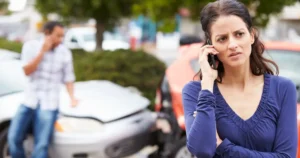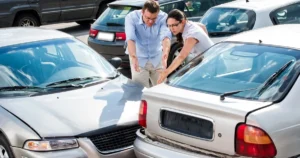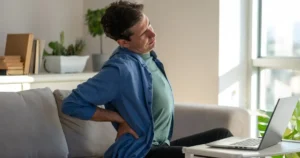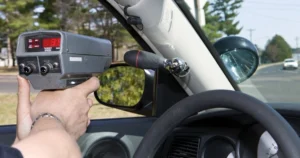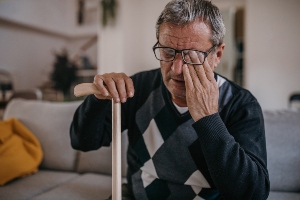 Some South Bend auto accidents may cause victims to experience blurry vision or other vision problems. This can happen even if your eyes do not appear to have suffered a physical injury in the collision.
Some South Bend auto accidents may cause victims to experience blurry vision or other vision problems. This can happen even if your eyes do not appear to have suffered a physical injury in the collision.
Below, our experienced South Bend car accident lawyers discuss vision problems after a car crash, including common causes and symptoms. We also discuss when you may be eligible to seek compensation for vision treatment and other damages.
Our firm has secured more than $200 million for our clients, many of whom were injured in motor vehicle collisions. We are prepared to help you navigate the legal process with no upfront costs.
Call our office today to schedule a free case review: (574) 444-0741.
Can Car Crash Trauma Cause Vision Problems?
Vision problems can be directly caused by a crash, such as if you cut your eyelid on something or a piece of crash debris gets lodged in your eye. However, blurry vision and other vision issues can also indicate a more severe car crash injury.
Facial Trauma
Injuries to the face, eye socket fractures or damaged facial nerves, can lead to impaired vision after a crash.
Traumatic Brain Injury (TBI)
Car crashes reportedly result in about 17 percent of all TBIs across the country. Concussions, which are a type of TBI, can occur even if the victim does not strike his or her head on a hard object. The impact of a collision can be enough to force the brain to hit the skull and cause a severe injury.
TBI symptoms commonly include:
- Blurry vision
- Impaired depth perception
- Headache
- Nausea with or without vomiting
- Extreme fatigue
- Speech problems
- Dizziness or balance issues
- Ringing in the ears
- Bad taste in the mouth
- Changes to your ability to smell things
- Sensitivity to light or sound
- Atypical behavioral, cognitive or mental symptoms
- Loss of consciousness for a few seconds or longer
- No loss of consciousness, but feeling confused or disoriented
- Mood changes; feeling depressed or anxious
Whiplash
Whiplash is a very common car crash injury affecting the victim’s neck and shoulder muscles, tendons and other soft tissue. The violent motion that causes whiplash could also damage or move vertebrae or discs in your spine, which could cause victims to suffer from blurry vision or double vision.
Other symptoms of whiplash may include neck pain, stiffness and increased pain when trying to move the neck. Headaches starting at the base of the head, soreness and pain in the upper back, arms and shoulders are also common symptoms, along with fatigue and dizziness.
Retinal Detachment
This eye injury happens when the retina is torn from the supportive tissue, removing it from its proper position. Once the retina detaches, it ceases to get the oxygen and nutrients it needs. This injury is painless and victims will need immediate laser surgery to have the retina reattached. Without treatment, the vision loss will become permanent.
Although the eye can be injured immediately, the retina may not detach for days or even weeks after the crash. Once you experience symptoms indicating the retina has detached, you must seek immediate medical care to avoid permanent blindness in that eye.
The primary symptoms of retinal detachment include the sudden onset of many floaters and sudden streaks or flashes of light in your eyes. Victims may also see what has been described as a dark shadow, curtain or veil appearing on either side or middle of their field of vision.
Why You Should Seek Immediate Medical Treatment for Vision Issues
Some car crash victims may assume that vision issues will go away on their own within a few days or weeks after an accident. However, not seeking immediate medical treatment could result in injuries getting worse or permanent vision loss.
Visiting a doctor or eye specialist can help crash victims get a diagnosis more quickly. Timely detection helps crash victims obtain the treatment they need sooner, whether it is surgery, medication, or other forms of treatment.
Eye injuries impact an individual’s job, hobbies, social life and psychological well-being. Immediate medical treatment can help to protect your vision problems from worsening or causing permanent damage.
Can I Get Compensated for Eye Injuries After a Car Accident?
Compensation for any injury is not promised after a car crash as there are many factors that could impact your eligibility. Even if you are eligible to recover damages, the amount of compensation you may be able to recover varies, depending on the severity and extent of your damages and injuries.
Car crash victims may be able to obtain compensation, however victims must first be able to prove the other driver was negligent.
What Type of Damages Can I Recover for Vision Problems?
Vision problems can greatly interfere with your daily quality of life. If your vision problems are due to someone else’s negligence, you may be eligible to recover compensation for these and other damages:
- Medical expenses: Frequent doctor visits for eye injury treatments, transportation to hospital and ongoing medication.
- Lost wages: If you have missed out on work opportunities or lost work hours due to your injuries
- Pain and suffering: The many types of emotional and physical discomfort and distress you may experience after being injured in a crash.
- Loss of companionship: Document how your vision problems prevent you from spending quality time with your family or participating in hobbies, sports or other activities you once enjoyed.
How Do I Prove That My Vision Problems Are Linked to the Accident?
If your crash and resulting injuries were caused by another party’s negligence, you will need to prove it. Seeking immediate medical attention is a vital step that can simultaneously protect your health and link your injuries to the crash.
If you fail to do this or wait until later, it will be difficult to link your vision problems or other injuries to the crash. The insurance company will have room to argue that your injuries could have happened elsewhere. The other reason for seeking medical attention is that only a qualified doctor can determine whether your vision problems are linked to your car accident.
Car crash victims can help to gather evidence to support their claim, such as:
- Medical records: These records include vital details about any injuries you suffered in the car crash, including the diagnoses of your vision problems, surgery or other treatment you received, medication that was prescribed and ongoing treatment you will need.
- Diary/Journal: Car crash victims should regularly document the pain and progress of their injuries in a diary or journal with a date attached. Be sure to include all associated costs, such as your medical bills. You should also document your daily pain levels, activities you can no longer do and more.
- Photos: Include images of eye injuries and damages caused by the crash, such as shattered windows or deployed airbags.
- Testimonials: Gather statements from family and friends testifying how the accident has affected the quality of your vision and emotional well-being after an accident.
Contact Our South Bend Office To Learn About Possible Legal Options
Trying to navigate the legal process while recovering from an injury can be overwhelming. You should consider working with an experienced attorney, as he or she can handle the legal issues for you so you can focus on your health and recovering from your injuries.
At Pfeifer, Morgan & Stesiak, we are committed to helping you recover the maximum compensation for your medical care and other post-crash damages. There are no upfront costs if you hire our services, as we only get paid if you do.
Call our firm today to discuss the details of your potential case. (574) 444-0741

